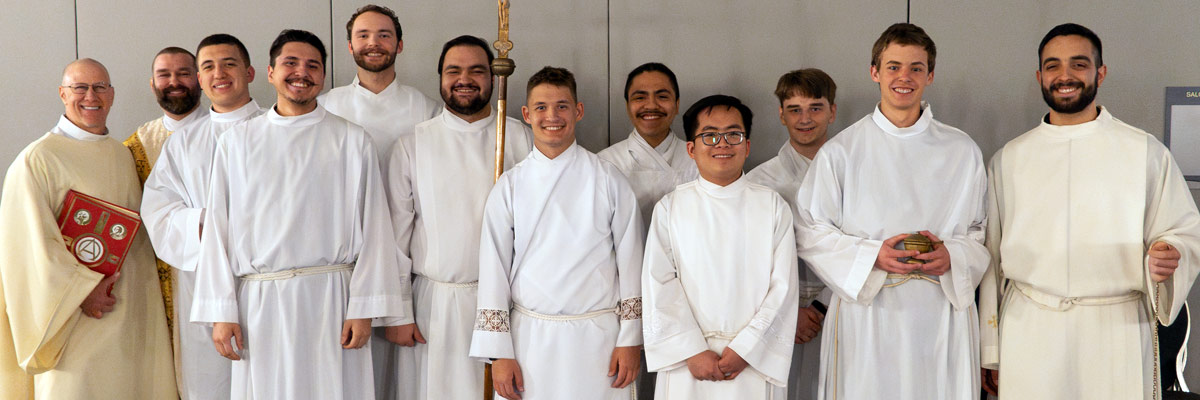Official Website of the
Catholic Diocese of Little Rock
Priesthood Ordination of Stephen Gadberry, Taryn Whittington, Mario Jacobo, Norman McFall and Joseph Chan
Published: May 28, 2016
Bishop Anthony B. Taylor preached the following homily at Christ the King Church in Little Rock on Saturday, May 28, 2016.

Bishop Taylor
Stephen, Taryn, Mario, Norman and Joseph, today I have the great honor of ordaining you to take your place in the care of Jesus' flock, to whose call you have responded with love and courage.
You already know that to be good shepherds, you must be willing to face adversity and even die for the sheep, like him whose alter ego — Alter Christus — you will become.
This imagery works when speaking about our work of guiding the flock, but it does not work when we focus on the behavior of the sheep. Real sheep, the four-legged kind, are not too bright and you need to prod them and goad them to keep them going the right direction.
Ninety-nine percent of the time, your ministry will require you to lead, but not compel; to inspire, and not shame; to encourage the sheep instead of rebuking them — and hopefully, that rare one percent of the time when rebuking is needed, might never arise if they know beyond a shadow of a doubt that you love them and revere them.
But the people you will serve as priests are not stupid sheep — God has blessed them with many gifts of intellect, many talents that you and I do not have. And he has also blessed them with sincere commitment to Jesus and his Church. They are our “co-workers in the vineyard.”
So as you begin your priestly ministry, I urge you to revere the people you serve … indeed, you will serve them best by empowering people to contribute their gifts, placing yourself at their service — not the other way around! The Church in
Our Church should be characterized by collegiality, not coercion; by intelligent discourse, not edicts imposed from on high; of ideas and values, not just legal rules.
Ninety-nine percent of the time, your ministry will require you to lead, but not compel; to inspire, and not shame; to encourage the sheep instead of rebuking them — and hopefully, that rare one percent of the time when rebuking is needed, might never arise if they know beyond a shadow of a doubt that you love them and revere them.
Love manifests itself in many ways. One is by treating others with compassion, and not judging them or their motives — especially in those upsetting moments when confronted with regrettable circumstances.
Love also manifests itself in the way we see and revere Christ in those we serve, especially in those high-maintenance sheep present in every parish — those who are poor materially or spiritually, those who are infirm physically or mentally, and those with special spiritual needs.
This becomes easier the more we recognize that we too have special needs, that we too are in some ways poor and infirm — "but for the grace of God, there go I!"
Here in
An important part of your work will be the effort to foster understanding, love and respect among all those whom Jesus entrusts to your care. Our diocese is a living mosaic of very diverse people of many ethnicities and several languages.
It is sort of like a stained glass window whose true beauty shines fully only when it is illuminated by the light of mutual love — when the variety of our cultures and races are allowed to shine forth brilliantly. The parishes in which you will begin your priestly ministry are all excellent examples of this.
As St. Benedict — in whose spirit four of you were formed at St. Meinrad — says so well, you should “arrange everything in such a way that the strong have something to strive for and the weak have nothing to fear.”
My brothers, with ordination, your life will change irrevocably — forever. In ways that you do not yet know, but which are according to God’s will. As you begin this ministry today, I exhort you to revere Christ who comes to you in the people you serve.




